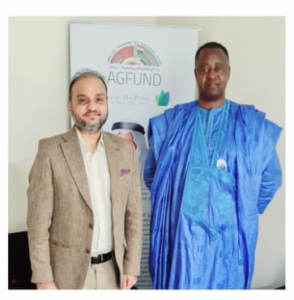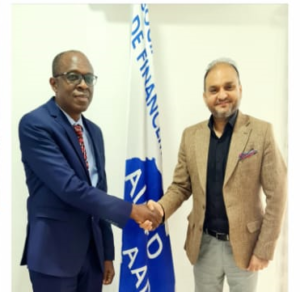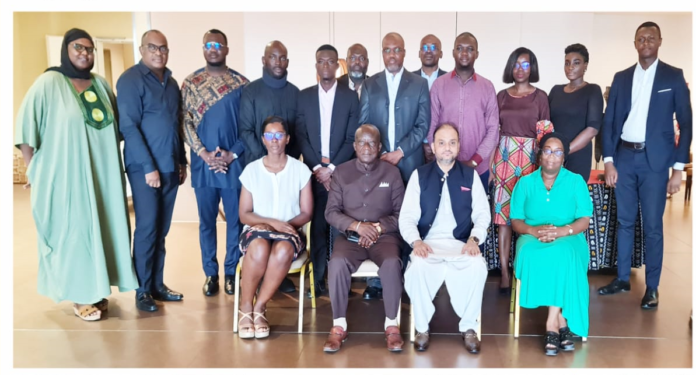Francophone markets dominated with Muslim Population have huge potential for Islamic Finance Industry Development; Muhammad Zubair
Dubai: AlHuda Centre of Islamic Banking and Economics (CIBE) top management visited the heart of Francophone markets Senegal, Ivory Coast, Mauritania and Guinea. The key objective of the visit was to analyze, evaluate and understanding about financial markets, adoptability and scope for Islamic Finance Industry. West Africa based on 16 Nations, among 5 are English speaking Gambia, Nigeria, Sierra Leone, Liberia and Ghana where AlHuda CIBE has in-depth foot prints, rest 11 Nations are French Speaking, overall, approximately 55% population is Muslim. In financial sector, Islamic finance industry is early stage of penetration, where big players are sitting as back benchers yet, but at the same time governments are playing significant role through issuance of Islamic Bonds (Sukuk) for mega projects to deploy cash flow from public.
 The interest from government and big francophone institutions like Coris Bank, Burkina Faso, Afriland First Bank, Cameroon, Bank for Commerce and Industry (BCI), Mauritania offering Islamic finance products through window operations regionally, Bank Islamic Senegal, Bank Islamic Guinea, Bank Islamic Niger, and Bank Islamic Mauritania are full-fledge Islamic Banks. There are some Takaful (Islamic Insurance) players as well through window operations like Leadway and Saar Assurance etc. Other than francophone, English speaking countries like Nigeria and Gambia are good with Islamic Banking, Takaful and Microfinance through window and full institutional practices.
The interest from government and big francophone institutions like Coris Bank, Burkina Faso, Afriland First Bank, Cameroon, Bank for Commerce and Industry (BCI), Mauritania offering Islamic finance products through window operations regionally, Bank Islamic Senegal, Bank Islamic Guinea, Bank Islamic Niger, and Bank Islamic Mauritania are full-fledge Islamic Banks. There are some Takaful (Islamic Insurance) players as well through window operations like Leadway and Saar Assurance etc. Other than francophone, English speaking countries like Nigeria and Gambia are good with Islamic Banking, Takaful and Microfinance through window and full institutional practices.
During mission to West Africa, Mr. Muhammad Zubair, Chief Executive Officer AlHuda CIBE meet with high level officials in Ivory Coast from Banking, Insurance, Microfinance and Fintech, also with Multilateral organizations associated organs. In Senegal he met with Islamic Banking, Capital and Money Market experts. He also met with Waqaf Authority, Takaful operators and microfinance sector. In Mauritania he met with top management of Central Bank, banking, microfinance, and capital market-oriented professionals. In Guinea, he met with Central Bank, banking and Microfinance officials. After having an in-detail interaction with Islamic Finance experts and the players who want to enter in this particular business area, he said that francophone Africa has huge potential and a strong regulatory support from regulators like BCEAO and individual central banks. As an expert with global experience, he observed and highlighted the gap areas and approach to overcome the gaps.
 As per our global presence and networking activities, he shared his intentions for two major activities to be organized by AlHuda CIBE significantly for francophone markets to play our role for bridging the gap in market. AlHuda CIBE will host an international conference in the heart of French speaking countries Dakar, Senegal in October 2024 the purpose is to create a platform for international partnerships, awareness and way forward for adoption of Islamic Finance through leadership. He also said that AlHuda CIBE will organize study and exposure visit programs for French players to any of the developed market where Islamic Finance Industry is very well established.
As per our global presence and networking activities, he shared his intentions for two major activities to be organized by AlHuda CIBE significantly for francophone markets to play our role for bridging the gap in market. AlHuda CIBE will host an international conference in the heart of French speaking countries Dakar, Senegal in October 2024 the purpose is to create a platform for international partnerships, awareness and way forward for adoption of Islamic Finance through leadership. He also said that AlHuda CIBE will organize study and exposure visit programs for French players to any of the developed market where Islamic Finance Industry is very well established.
During the Year it was our first Mission to West Africa where we went to Senegal, Mauritania, Guinea and Ivory Coast, in second phase we will be going to Togo, Benin, Burkina Faso and Mali in the month of August. In his concluding remarks he said, “Our mission to West Africa highlights AlHuda CIBE commitment to fostering the growth of Islamic banking and finance across the continent. The region holds immense potential, and our engagements with key stakeholders have been incredibly productive. We are excited about the future of Islamic finance in West Africa and look forward to expanding our efforts to include other countries in the next phase of our mission. This initiative is not just about financial growth but also about promoting economic justice and financial inclusion through Islamic finance principles.”





